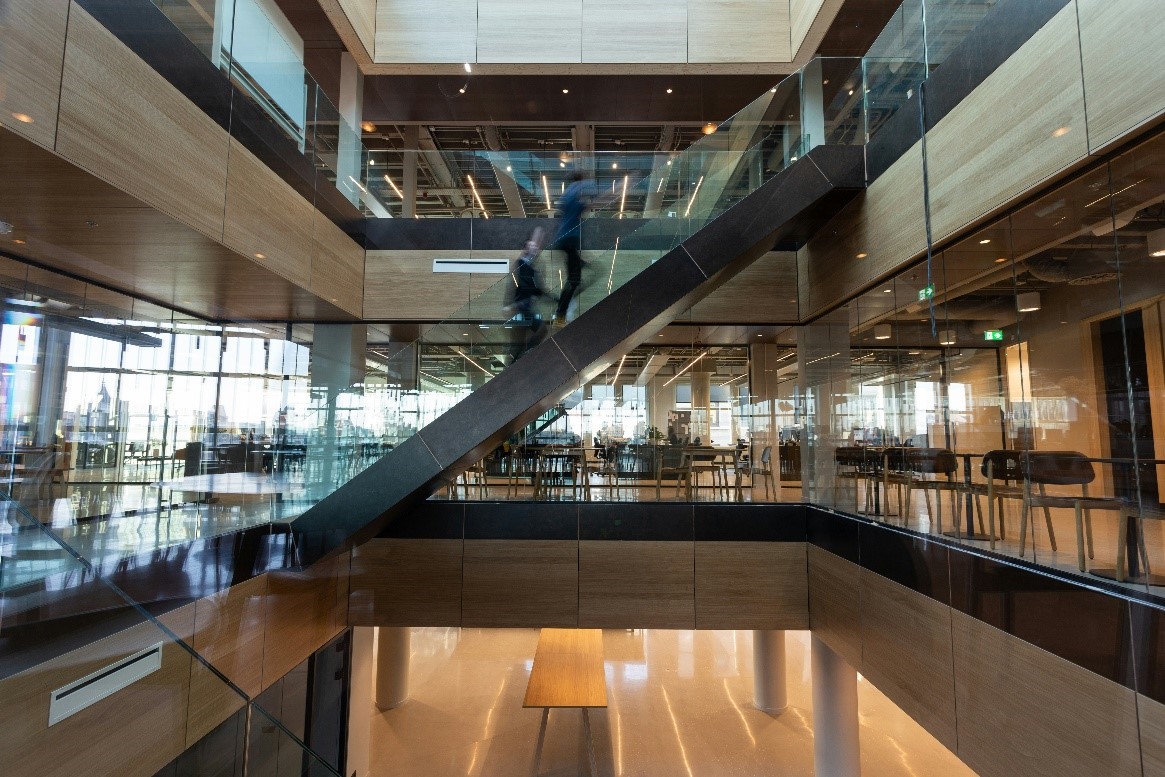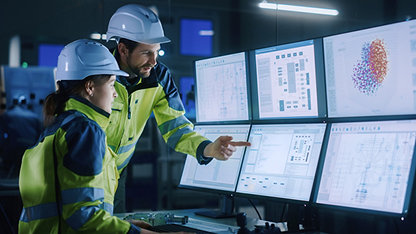We live in an era where technological advancements are reshaping industries at an unprecedented pace. As a result, the practice of facility management may be standing on the brink of a profound transformation.
A new era
Artificial intelligence (AI) holds the promise to revolutionise conventional practices and responsibilities in facility management. From optimising space utilisation to predictive maintenance, AI-driven tools and algorithms are poised to streamline processes, enhance decision-making capabilities, and unlock novel possibilities.
It is crucial to examine how this innovative and potentially disruptive technology will influence the future of facility management, reshaping the roles and practices of professionals in this field across the built environment.

The role of a facilities manager
The role of a facilities manager is essential within the built environment, encompassing the total management of all services and infrastructure that support an organisation's core business.
‘Facilities Management is integral in workspace strategy as well as supporting business continuity and when delivered well can drive employee engagement as well as helping attract and retain the best talent.’ RICS, Facility Management pathway guide, February 2018
A facility manager’s key responsibilities include:
· Strategic Planning
· Budgeting and Financial Management
· Vendor Management
· Space Planning and Utilisation
· Maintenance and Operations
· Health and Safety Compliance
· Environmental Sustainability
· Security and Access Control
· Emergency Preparedness
· Tenant and Stakeholder Communication
· Technology Integration
For more details on a Facility Manager’s role, see Sector pathways (rics.org)

AI is a revolutionary field that aims to create computer systems capable of performing tasks that typically require human intelligence. From speech recognition to problem-solving, AI has the potential to transform various industries and improve our daily lives.
According to Futurism, the progress of AI can be understood in three distinct waves, each representing a significant leap forward in its capabilities.
1. The first wave saw algorithms and software based on experts’ own knowledge, but these systems struggled to adapt to uncertainty.
2. The second wave brought forth statistical learning, where models were trained on vast amounts of data to improve accuracy. However, despite impressive results, the systems’ inner workings lacked a clear understanding of how they reached their conclusions.
3. The third wave of AI was marked by sophisticated AI systems that could understand and respond to the context of a situation. However, development of these advanced systems required extensive research and innovation.
Today, we are in the fourth wave of AI, with generative models like ChatGPT and large language models catalysing transformative advancements across various domains. Natural language processing (NLP) allows virtual assistants like Siri and Alexa to respond to spoken or written commands. Image and video recognition enable automated tagging, content filtering and visual search capabilities, benefiting areas like self-driving cars and social media.
NLP can also be used in the workplace. Voice recognition can be used in meetings, allowing for automated transcripts, notes and documentation. Documents can also be transferred into structured data, which could be a huge benefit to a range of surveying professions. Moreover, AI's integration into robotics has opened doors to tangible applications, enhancing tasks in manufacturing, healthcare and beyond.

As AI continues to advance, we can expect further breakthroughs and possibilities. The future holds the promise that AI systems will not only surpass human capabilities but also possess a deep understanding of the world, providing us with remarkable insights and transforming the way we live and interact with technology.
How will AI shape the role of a facility manager?
Property Management
Efficient property management is vital for businesses, and AI-driven tools significantly contribute to enhancing this process. AI in property management, exemplified by IBM's TRIRIGA, an Integrated Workplace Management System (IWMS), introduces advanced capabilities that revolutionise the way property managers operate. TRIRIGA utilises artificial intelligence to enable real-time spatial analytics, offering property managers insights into space utilisation patterns. The system leverages AI for occupancy insights, analysing data to understand usage patterns and optimise space allocation. Additionally, TRIRIGA employs environmental factor analysis, allowing property managers to create healthier and more efficient workplaces by considering factors like lighting, ventilation, and temperature. This intelligent IWMS equips property managers with tools for data-driven decision-making, optimising space utilisation, and fostering healthier workplaces. TRIRIGA's AI-driven features extend to intelligent asset management, supporting comprehensive lease administration and facilitating dynamic space planning. By providing real-time insights and efficient lease administration, IBM's TRIRIGA transforms property management processes, ensuring optimal operational control through the strategic application of artificial intelligence.
Stakeholder Interactions
AI has revolutionised stakeholder interactions in facility management through tools like Natural Language Processing (NLP), enhancing communication and responsiveness. For instance, companies like Zendesk employ AI-powered chatbots to streamline facility-related inquiries. These chatbots equipped with advanced NLP capabilities promptly address queries, contributing to efficient facility management support. This real-world example showcases the practical impact of AI in fostering transparent and responsive communication within the facility management sector.
Space Utilisation
Efficient space utilisation is a crucial aspect of facility management, and AI plays a significant role in optimising this process. Beringar, a provider of powerful building intelligence, offers real-time insights into building occupancy and space utilisation through its end-to-end platform. By deploying AI algorithms, Beringar analyses space usage patterns, occupancy rates, and historical data, providing valuable information to identify opportunities for improved space utilisation. One notable aspect is Beringar's contribution to enhancing air quality within facilities. With a significant amount data points collected by the Beringar HX Series sensor, the platform offers a forensic level of detail regarding air quality. This capability allows organisations to monitor and improve air quality, ensuring a healthier and safer environment for staff and guests. By leveraging AI insights from platforms like Beringar, organisations can strategically redesign spaces for enhanced functionality, allocate resources more efficiently, and ultimately reduce operational costs, all while prioritising the well-being of occupants.
Predictive Maintenance
Predictive Maintenance, facilitated by AI-driven and IoT-enabled systems, as demonstrated by companies such as The Network Control Group, an RICS Tech Partner, has transformed how organisations manage their assets. Through the analysis of historical data and patterns, AI can predict potential equipment failures, enabling proactive maintenance measures. This proactive approach can minimise downtime, prolong asset lifespan, and result in substantial cost savings. Incorporating AI-driven and IoT-enabled predictive maintenance strategies ensures a seamless and efficient operation of facilities, aligning with the evolving landscape of smart and connected solutions in the energy and building management sectors. Additionally, R8 Technologies, also an RICS Tech Partner, exemplifies the application of AI in predictive maintenance with its AI solution, the R8 Digital Operator. This system leverages AI to predict and prevent equipment failures, contributing to enhanced operational efficiency, prolonged asset lifespan, and significant cost savings for organisations.
Health and Safety Compliance
In the field of health and safety, AI is becoming more prominent. Through computer vision and machine learning algorithms, AI can monitor and analyse safety protocols, identify potential hazards, and even predict potential risks. This proactive approach to health and safety enhances compliance efforts, reduces the likelihood of accidents, and creates a safer working environment for all stakeholders. ScanQuo, an RICS Tech Partner, is primarily known for estimating cleaning costs for buildings though its innovative solution utilises existing 3D laser scanning, BIM, and CAD files to enhance accuracy in identifying assets, objects, measurements, and surface areas within the interior of a building. This unique application contributes to the overall safety and compliance of facilities, highlighting the versatility of AI in addressing various aspects of health and safety management.
Taking a look at another aspect of health and safety, BiocareUV, another RICS Tech Partner has developed a product offers efficient and continuous disinfection, ensuring safer, pathogen-free environments. By integrating AI with Far UVC technology at 222nm, BiocareUV not only ensures efficient protection against pathogens but also dynamically adapts UV system power based on room occupancy.
Energy Efficiency
In our pursuit of Net Zero goals, prioritising energy efficiency is more crucial than ever in facility management, and AI plays a pivotal role in its optimisation. Advanced AI algorithms can analyse energy consumption patterns, identify areas of waste, and recommend optimisations to reduce overall energy usage. This not only leads to substantial cost savings for organisations but also aligns seamlessly with sustainable practices. R8 Technologies, an RICS Tech Partner, presents a comprehensive solution with the R8 Digital Operator, an award-winning autonomous AI HVAC software for commercial real estate. This innovative solution integrates with building management systems, autonomously adjusting heating, ventilation, and air conditioning based on real-time data. The R8 Digital Operator ensures efficient energy utilisation, contributing to cost savings while maintaining optimal working conditions. R8 Technologies stands as a pioneering example of leveraging AI to enhance energy efficiency in facility management, offering a pathway towards a greener and more cost-effective future.
Workflow Automation
Workflow automation is a key area where AI can streamline processes for facility managers. AI-driven automation can handle routine and repetitive tasks, such as scheduling maintenance activities, managing inventory, and processing administrative paperwork. This allows facility managers to focus on more strategic aspects of their roles, improving overall productivity and efficiency. For instance, Facilio specialises in providing AI-powered facilities optimisation solutions, offering real-time insights into building operations, predictive maintenance, and energy efficiency. On the other hand, ServiceChannel focuses on automating and optimising service-related workflows, including maintenance, repairs, and vendor management, enabling seamless facility operations. These innovative solutions contribute to a more efficient and proactive approach to facility management.
In sectors where facilities cater to customers, the integration of AI enhances the overall customer experience. Whether through personalised interactions, predictive services, or smart navigation within a facility, AI contributes to creating a positive and seamless experience for customers. For example, innovative workplace experience platforms like SpaceOS and MANAGBL AI, both RICS Tech Partners, leverage AI to further elevate user experiences. Features such as social desk booking, access control, event booking, and efficient customer service operations through automation demonstrate how these platforms are at the forefront of enhancing customer experiences in various sectors. MANAGBL AI specifically focuses on optimising customer service efficiency by automating service requests and offering intelligent call handling, showcasing its commitment to modernising and streamlining customer service processes.
How should facility managers upskill?
The impact of AI on facility management necessitates a proactive approach to upskilling for professionals I n this field. As AI-driven tools become integral to daily operations, facility managers must adapt and acquire new skills to effectively leverage these technologies. Here are key areas for upskilling:
1. Data Literacy:
Understanding and interpreting data generated by AI systems is crucial. Facility managers should enhance their data literacy to derive meaningful insights from AI-driven analytics, enabling informed decision-making.
2. AI System Management:
Proficiency in managing and overseeing AI systems is essential. Facility managers need to familiarize themselves with the functionalities of AI tools, ensuring efficient utilization and troubleshooting when necessary.
3. Cybersecurity Awareness:
With the integration of AI comes increased reliance on digital systems. Facility managers must develop a strong awareness of cybersecurity measures to protect sensitive data and maintain the integrity of AI-driven technologies.
4. Collaboration with AI:
Upskilling should also focus on fostering collaboration between human professionals and AI systems. Facility managers need to understand how to integrate AI into existing workflows, optimising efficiency, and productivity.
5. Continuous Learning:
Given the rapid advancements in AI, a commitment to continuous learning is paramount. Facility managers should stay informed about emerging technologies and industry best practices, attending workshops, webinars, and training programs.
Transforming the role
In conclusion, the rise of holds a profound transformation in roles and responsibilities within facility management. Facility managers who embrace this shift through proactive upskilling will not only stay relevant in the evolving landscape but also contribute to unlocking the full potential of AI-driven advancements. While AI may reshape certain aspects of the job, the focus should be on augmenting human expertise rather than replacing it entirely. By equipping oneself with AI skills, facility managers can not only adapt to the changing environment but also mentor and guide the next generation, ensuring that the integration of AI enhances rather than diminishes the profession. The future of facility management relies on integrated collaboration between human ingenuity and artificial intelligence in order to deliver operational efficiency.













